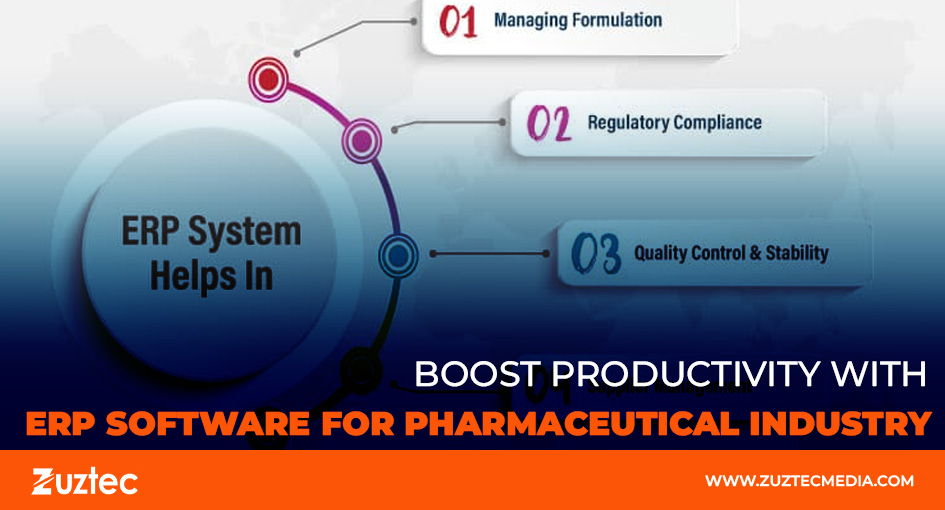
Boost Productivity with ERP Software for Pharmaceutical Industry
In the pharmaceutical industry, efficiency, accuracy, and compliance are critical to maintaining smooth operations. As businesses deal with complex manufacturing processes, stringent regulatory requirements, and an extensive supply chain, managing these aspects manually can lead to inefficiencies and errors. This is where ERP software for pharmaceutical industry plays a crucial role. Enterprise Resource Planning (ERP) software integrates various business functions into a single, centralized system, streamlining operations, improving efficiency, and ensuring compliance with industry regulations. By automating inventory management, tracking production processes, and providing real-time insights, ERP software helps pharmaceutical companies boost productivity and reduce operational risks.
With an ERP system, companies can maintain accurate records, ensure timely drug production, manage compliance documentation, and improve supply chain visibility. These features not only enhance workflow efficiency but also contribute to better decision-making and cost savings. Implementing the right ERP solution allows pharmaceutical businesses to focus on innovation while maintaining regulatory adherence and operational excellence. In this article, we will explore how ERP software enhances productivity in the pharmaceutical industry and why adopting an ERP system is essential for business growth.
How ERP Software for Pharmaceutical Industry Enhances Productivity
1. Centralized Data Management
An ERP system consolidates all business data into a single platform, reducing redundancies and improving data accuracy. This eliminates the need for manual data entry and ensures that employees have access to up-to-date information, allowing for better coordination across departments.
By having a centralized database, businesses can track critical details such as production schedules, compliance reports, and inventory levels in real-time. This ensures that decision-makers have access to accurate insights, preventing costly errors and improving operational efficiency.
2. Automated Compliance and Regulatory Reporting
Pharmaceutical companies must comply with strict regulations such as FDA (Food and Drug Administration), GMP (Good Manufacturing Practice), and ISO (International Organization for Standardization) standards. ERP software helps automate compliance tracking, ensuring all necessary documentation, quality checks, and audit trails are maintained effortlessly.
Through automated reporting features, pharmaceutical companies can generate compliance documents with accuracy, reducing the risk of penalties and regulatory setbacks. Furthermore, having an ERP system ensures that all processes align with the latest industry standards, avoiding disruptions due to non-compliance.
3. Efficient Supply Chain Management
Managing the pharmaceutical supply chain requires precision, as any disruption can lead to production delays or medication shortages. ERP software enables real-time tracking of raw materials, inventory levels, and shipments, allowing companies to optimize supply chain operations and prevent bottlenecks.
An efficient supply chain also ensures that essential medications reach the market on time. By integrating supply chain data within the ERP system, businesses can make better purchasing decisions, prevent stock shortages, and optimize warehouse management.
4. Improved Production Planning and Scheduling
ERP software helps businesses streamline production processes by automating planning and scheduling. This ensures efficient resource allocation, reduces downtime, and enhances overall manufacturing productivity. By tracking batch production and monitoring real-time progress, companies can meet deadlines while maintaining quality control.
With production planning features, ERP software for pharmaceutical industry allows companies to allocate labor, machinery, and materials efficiently. This results in a higher output with fewer disruptions, ensuring that manufacturing plants operate at optimal levels.
5. Cost Reduction and Waste Management
Manual processes often lead to unnecessary waste and increased costs. ERP systems provide real-time insights into material usage, production efficiency, and potential wastage, allowing companies to optimize resource utilization. By minimizing waste and reducing errors, pharmaceutical companies can achieve significant cost savings.
In addition, ERP software helps track expenses related to raw materials, packaging, distribution, and compliance. This allows businesses to identify cost-saving opportunities and allocate budgets more effectively.
6. Real-Time Analytics and Business Intelligence
ERP software provides advanced analytics and reporting tools, offering valuable insights into business operations. Managers can monitor key performance indicators (KPIs), track sales trends, and make data-driven decisions to improve overall efficiency.
With real-time dashboards, pharmaceutical companies can assess factors such as inventory turnover, production efficiency, compliance adherence, and customer demand. These insights allow businesses to adjust their strategies and maximize growth potential.
7. Enhanced Quality Control
Ensuring the quality of pharmaceutical products is paramount. ERP systems integrate quality control checks into every stage of the manufacturing process, from raw material procurement to final product distribution.
Automated quality checks in ERP software for pharmaceutical industry help detect defects early, ensuring that only safe and effective medicines reach the market. Additionally, ERP software allows businesses to track product recalls, monitor adverse reactions, and maintain detailed quality assurance reports.
8. Increased Collaboration and Workflow Efficiency
With a centralized ERP system, different departments—such as production, sales, procurement, and finance—can collaborate seamlessly. Improved communication and workflow automation reduce delays, eliminate errors, and enhance overall operational efficiency.
For example, when a sales team logs a high-demand order, the ERP system automatically updates inventory levels and alerts the production team to adjust manufacturing schedules accordingly. This level of automation and synchronization minimizes errors and improves interdepartmental coordination.
9. Better CRM with ERP Software for Pharmaceutical Industry
ERP software also enhances customer relationship management by keeping track of customer orders, preferences, and feedback. By analyzing customer demand trends, pharmaceutical businesses can offer personalized solutions, improve service delivery, and ensure timely medication availability.
To sum up, the pharmaceutical industry faces numerous challenges, including strict regulatory requirements, supply chain complexities, and the need for efficient production management. ERP software for pharmaceutical industry provides an all-in-one solution to streamline operations, ensure compliance, and improve overall productivity. By automating critical processes, reducing errors, and offering real-time insights, ERP systems enable pharmaceutical businesses to stay competitive in an evolving market. From managing inventory to ensuring compliance and optimizing workflows, ERP solutions play a vital role in modern pharmaceutical manufacturing. Adopting a robust ERP system is no longer a luxury but a necessity for pharmaceutical companies aiming for sustainable growth, operational efficiency, and regulatory adherence. Investing in the right ERP software will not only enhance productivity but also help businesses maintain a high standard of quality and efficiency in their operations.

